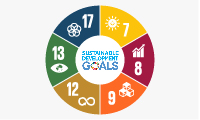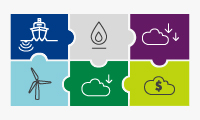Report Review Panel
We have used external review panels to strengthen our sustainability reporting since 2005. They help us evaluate and improve the quality and credibility of our Sustainability Report.
The 2017 Report Review Panel, previously called the External Review Committee, comprises six sustainability and corporate reporting experts. Panel members are offered an honorarium for their time and expertise. This year’s panel comprised:
- Faris Natour, Germany/USA. Director, Human Rights & Business Initiative, UC Berkeley Haas School of Business, (Chair of the Report Review Panel)
- Andrew Logan, USA. Director, Oil and Gas, Ceres
- Changhua Wu, China. Chair, China Redesign Hub and Asia Region liaison, Office of Jeremy Rifkin
- Marie Morice, USA. Senior advisor, Natural Capital Finance Alliance
- Mandy Kirby, UK. Director, Principles for Responsible Investment
- Merene Botsio Tamakloe, Ghana/UK. New Partnerships Manager, CARE International
You can read more about the panel members on www.shell.com
The panel provided input as part of our content selection process and reviewed the report in depth before preparing their statement focusing on the quality of the report. The panel met to discuss Shell’s reporting, question Shell experts and prepare their statement.
The 2017 panel’s mandate focused on the quality – including the credibility, completeness and responsiveness – of Shell’s reporting.
Read below some of the feedback given in the 2016 report by the expert reviewers, and our response (see table).
2016 recommendations and responses
2016 recommendations and our responses
2016 recommendation
Shared value and social performance: For stakeholders to understand shared value and see its impact, future reporting needs to describe how it is embedded throughout Shell’s business and overall sustainable development agenda.
How Shell responded in 2017
In the 2017 report, you can read more about how Shell is contributing to society and how this is connected to the UN's sustainable development goals.
2016 recommendation
Energy transition and climate change: There is a lack of discussion about how exploration and production will change over time or how in these two areas Shell will prioritise investments and activities.
The report does not share with readers any targets to indicate the intended pace of Shell’s transition to a lower-carbon portfolio and it is recommended that the report include such goals in future.
How Shell responded in 2017
Shell’s climate change thinking is detailed in the introduction from our CEO and Energy Transition section. You can also read more in the Shell Energy Transition Report at www.shell.com/energytransitionreport.
2016 recommendation
Product stewardship and circular economy: It is recommended that the company shares more in the report about the policies and plans that will guide development of Shell thinking on product stewardship including end of life as well as the ways that the circular economy may affect Shell’s businesses.
How Shell responded in 2017
Read about our Product Stewardship policies.
2016 recommendation
Divestments: The report should explain to stakeholders how Shell addresses the environmental and social liabilities associated with divested assets.
How Shell responded in 2017
In our Divestment section, you can read about our approach and how we have managed some recent cases.
2017 recommendations letter
Report Review Panel - Independent Statement
The Report Review Panel provides this independent statement on Shell’s 2017 Sustainability Report. We have had the opportunity to review two drafts of the 2017 Sustainability Report and provide feedback to Shell through conference calls and in writing. Shell has responded to our questions and suggestions. We have developed this statement independently following our review. We commend Shell on its commitment to transparency, stakeholder engagement, and continuous improvement in its approach to sustainability reporting.
We appreciate the opportunity to provide feedback and recommendations for further improving Shell’s sustainability reporting. In line with the scope of our review, our feedback focuses on the quality of Shell’s sustainability reporting rather than its sustainability performance.
The 2017 Sustainability Report focuses largely on the sustainability issues the company has identified as most material through a materiality analysis. It does so in a thorough, rigorous, and comprehensive way and provides important information in a clear, accessible and concise format. In future reporting, we recommend that Shell provides more comprehensive disclosure on social issues and water, greater balance between successes and areas for improvement, as well as greater emphasis on the ways in which the company's sustainability efforts strengthen its core business.
The disclosure on Shell’s approach to the energy transition and its emissions disclosure are particularly comprehensive, although more emphasis on the interconnectedness between energy, water, ecosystems and watershed management could further improve Shell’s reporting. The inclusion of independent statements as well as case studies provide important context to the description of Shell’s strategic priorities and management approach in sustainability. However, we encourage the company to seek out greater balance by highlighting external opinions and case studies that offer constructive criticism of its performance.
Recommendations: We see opportunities to further improve Shell’s sustainability reporting in the following ways:
- Social issues: While the report provides a thorough review of Shell’s material issues, we would like to see more detailed disclosure of social issues, including Shell’s holistic approach to contributing to the UN's sustainable development goals (SDGs), human rights due diligence, and operating in sensitive areas. We are aware that Shell provides some information on these topics on www.shell.com but we would urge the company to ensure that sufficient depth is provided in the report on these important topics. We welcome that Shell has identified the SDGs it views as most relevant to the business. Moving forward, we expect Shell to integrate the SDGs more in its reporting and provide additional information about how Shell is advancing the SDGs as a company and in partnership with others. In addition, Shell has an opportunity to more clearly emphasize the interconnectedness between environmental and social issues. We also view gender diversity and inclusion as a material issue for all companies, and Shell could provide more detail in its sustainability reporting on its approach to advancing diversity and inclusion at Shell and in the energy sector.
- Water: We see water as an increasingly important topic and would welcome more information on how Shell manages impacts on water beyond the facilities level. This should include information on how Shell is mitigating broader watershed impacts as well as steps it has taken to reduce risk exposure including through the setting of targets. We would also welcome data on Shell’s water performance that is specific to particular assets and geographies, as water is largely a local issue and global data reveals little to a reader.
- Balance: While the report highlights both successes and areas for improvement, overall there is an emphasis on success in the report. We see an opportunity for Shell to improve the report’s overall balance and drive continuous improvement in the energy sector by including more discussion of challenging experiences, lessons learned and areas for improvement. In addition, while we commend Shell for including independent statements from civil society organisations throughout the report, we encourage it to seek more diverse voices of constructive criticism in future.
- Metrics: We would like to see Shell provide more context for the performance data included in the report. It is not apparent for all metrics what factors contributed to a specific outcome and what impact any management steps taken by Shell have had. Including more of this kind of information will help readers understand how Shell achieved or did not achieve the targets the company has set for itself.
- Strategic focus and ease of navigation: We appreciate Shell’s effort to strive for completeness. Future reports could be simplified further by putting greater emphasis on the ways in which the company's sustainability efforts strengthen its core business. Shell could highlight fewer case studies while going into more detail and linking each more closely to the broader operating context for the sustainability priorities they seek to illustrate. Similarly, we would welcome more sign-posting to highlight the various connections across the report to Shell's strategic priorities.
Robust sustainability disclosure is essential for Shell to meet the ambitious goals it has set for itself and for Shell’s stakeholders to assess progress and hold the company to account. We appreciate the opportunity to share our feedback and recommendations. While we saw improvements during the drafting stage, there remain opportunities to further improve Shell’s reporting, and we look forward to reviewing Shell’s progress in these areas in future reports.
 Sustainability at Shell
Sustainability at Shell
 Sustainable development goals
Sustainable development goals
 About our data
About our data
 Energy transition and climate change
Energy transition and climate change